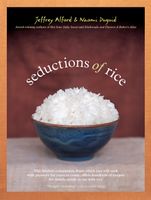Advertisement
Daily Labor
Appears in
By Jeffrey Alford and Naomi Duguid
Published 1998
After I had stayed for several days in Marsassoum, some of my first dreamlike journey through the village began to take on more meaning. I came to know the house where salt was made each day (by rinsing salt-laden riverbank sand with water, then boiling it down until only salt crystals remained) and what the women were pounding in their mortars. I could even find my way to the river on my own. But the sense of wonder, of another world, remained.
The daily household chores alone were humbling. In the mornings, Sarta cleans rice for the noon meal, first taking a sheaf of rice still on the stalk and pounding it in the large mortar, then winnowing away the straw and chaff, then putting the grain back in the mortar to be pounded until polished white, and finally winnowing away the last of the chaff and bran. After the rice comes millet. Starting with whole millet, and often working with her wiry, alert twelve-year-old daughter, also named Sarta, she pounds and pounds with the pestle, raising it high each time. The result after an hour’s heavy labor and some winnowing is a pile of millet flour. Later in the day, Sarta will spend another hour tossing and sifting some of the flour into fine millet couscous. The rest she hand-rolls in the evening, by the light of a lantern, into small even balls to be boiled for the morning’s breakfast porridge.

